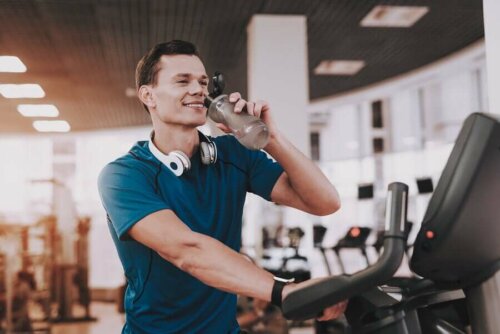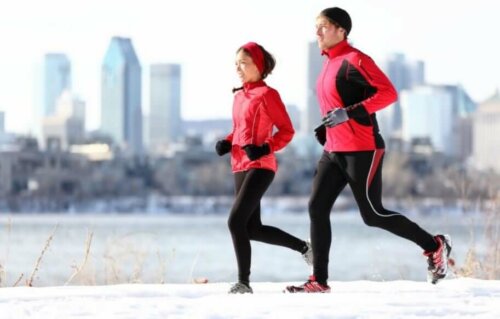How to Stay Hydrated in the Winter

Hydration is an essential part of an athlete’s life. Improper hydration can lead to poor performance in the short term, which is why it’s so important to be aware of your fluid and mineral intake. The importance of hydration is obvious in the summer when the weather is hot and humid. However, staying hydrated in the winter is just as important, especially if you’re doing high-intensity exercise.
Today, we’ll talk about the three stages of the hydration process. The first is pre-workout hydration, the second is hydration during your workout, and the third is recovering lost fluids post-workout.
Stay hydrated in the winter: drinking fluids before a workout
Before a workout, the purpose of nutrition is to provide your body with everything it needs for the development of physiological functions in stressful situations. Water, of course, is one of those fundamental elements.
In the two hours before a training session or a competition, drinking enough fluids is essential. In the winter, however, you don’t usually need to worry about their electrolyte or mineral content.
It’s often enough to just drink room temperature water. In the winter, don’t drink water that’s too cold in order to avoid stomach issues.
To keep things interesting and stay hydrated in the winter, try eating fruit with high water content, such as apples or pears.

How to stay hydrated in the winter during a workout
Once you’ve started working out, be diligent about your fluid intake, especially if you exercise for more than 20 minutes. If you work out for longer than that, you should drink at least 150 ml of water every 15 minutes to be properly hydrated. You can also drink whenever you feel thirsty, even if the temperatures outside are low.
This could be a good time to add certain nutrients to your water, either to compensate for what you lose through your sweat or just to get a boost. Any kind of isotonic drink with a certain level of sodium and minerals should be enough for a short workout.
If you’re doing some kind of endurance training, you might need to add some carbohydrates [1]. You might try adding sugars with a high-glycemic-index to avoid fatigue during endurance training, but keep in mind that you shouldn’t overdo it [2]. Anything with more than an 8 percent concentration could cause stomach irritation.
Replacing nutrients after a workout
When you’re done training, it’s time to replace the nutrients you lost during the workout. That helps your body recover and promotes super-compensation mechanisms.
Post-workout consumption of macronutrients is important, but so is replacing fluids. Studies suggest that you need to replace at least 150 percent of the water weight you lose during your workout in the six hours immediately following physical activity.
At this stage, the best option is plain water because your body can process it quickly and efficiently. Not only that, but you usually get your micronutrients and minerals from solid food post-workout, which is why you don’t need to rely on sports drinks.
One interesting option is to eat a certain amount of easy-to-digest proteins and carbs along with your drink to give your body the nutrients it needs to start the recovery process. This is a great strategy to reduce the likelihood of sports injury during training or competition.

In conclusion…
You don’t have to worry about health risks related to heat and humidity in the winter. However, staying hydrated is still vitally important. Drinking enough water and being aware of fluid intake will help you perform well and avoid injury to your muscles and joints.
Drinking water on a regular basis is usually enough, though you might want to mix it up with sports drinks every once in a while. Adding a certain amount of proteins and carbs to your post-workout drink can also help accelerate your recovery and maximize super-compensation. Follow these tips, and you’ll stay hydrated and feel great during your winter workouts.
Hydration is an essential part of an athlete’s life. Improper hydration can lead to poor performance in the short term, which is why it’s so important to be aware of your fluid and mineral intake. The importance of hydration is obvious in the summer when the weather is hot and humid. However, staying hydrated in the winter is just as important, especially if you’re doing high-intensity exercise.
Today, we’ll talk about the three stages of the hydration process. The first is pre-workout hydration, the second is hydration during your workout, and the third is recovering lost fluids post-workout.
Stay hydrated in the winter: drinking fluids before a workout
Before a workout, the purpose of nutrition is to provide your body with everything it needs for the development of physiological functions in stressful situations. Water, of course, is one of those fundamental elements.
In the two hours before a training session or a competition, drinking enough fluids is essential. In the winter, however, you don’t usually need to worry about their electrolyte or mineral content.
It’s often enough to just drink room temperature water. In the winter, don’t drink water that’s too cold in order to avoid stomach issues.
To keep things interesting and stay hydrated in the winter, try eating fruit with high water content, such as apples or pears.

How to stay hydrated in the winter during a workout
Once you’ve started working out, be diligent about your fluid intake, especially if you exercise for more than 20 minutes. If you work out for longer than that, you should drink at least 150 ml of water every 15 minutes to be properly hydrated. You can also drink whenever you feel thirsty, even if the temperatures outside are low.
This could be a good time to add certain nutrients to your water, either to compensate for what you lose through your sweat or just to get a boost. Any kind of isotonic drink with a certain level of sodium and minerals should be enough for a short workout.
If you’re doing some kind of endurance training, you might need to add some carbohydrates [1]. You might try adding sugars with a high-glycemic-index to avoid fatigue during endurance training, but keep in mind that you shouldn’t overdo it [2]. Anything with more than an 8 percent concentration could cause stomach irritation.
Replacing nutrients after a workout
When you’re done training, it’s time to replace the nutrients you lost during the workout. That helps your body recover and promotes super-compensation mechanisms.
Post-workout consumption of macronutrients is important, but so is replacing fluids. Studies suggest that you need to replace at least 150 percent of the water weight you lose during your workout in the six hours immediately following physical activity.
At this stage, the best option is plain water because your body can process it quickly and efficiently. Not only that, but you usually get your micronutrients and minerals from solid food post-workout, which is why you don’t need to rely on sports drinks.
One interesting option is to eat a certain amount of easy-to-digest proteins and carbs along with your drink to give your body the nutrients it needs to start the recovery process. This is a great strategy to reduce the likelihood of sports injury during training or competition.

In conclusion…
You don’t have to worry about health risks related to heat and humidity in the winter. However, staying hydrated is still vitally important. Drinking enough water and being aware of fluid intake will help you perform well and avoid injury to your muscles and joints.
Drinking water on a regular basis is usually enough, though you might want to mix it up with sports drinks every once in a while. Adding a certain amount of proteins and carbs to your post-workout drink can also help accelerate your recovery and maximize super-compensation. Follow these tips, and you’ll stay hydrated and feel great during your winter workouts.
All cited sources were thoroughly reviewed by our team to ensure their quality, reliability, currency, and validity. The bibliography of this article was considered reliable and of academic or scientific accuracy.
- Jeukendrup A., A step towards personalized sports nutrition: carbohydrate intake during exercise. Sports Med, 2014.
- Nuccio RP., Barnes KA., Carter JM., Baker LB., Fluid balance in team sport athletes and the effect of hypohydration on cognitive, technical and physical performance. Sports Med, 2017. 47 (10): 1951-1982.
This text is provided for informational purposes only and does not replace consultation with a professional. If in doubt, consult your specialist.








